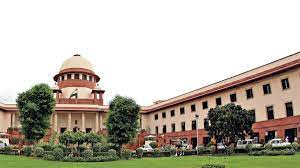In which it was held that the appellant cannot claim first charge over the property of the Corporate Debtor, as Section 48 of the Gujarat Value Added Tax 2003 (hereinafter referred to as the ‘GVAT Act’) cannot prevail over Section 53 of the Insolvency and Bankruptcy Code 2016 (hereinafter referred to as the IBC). (Para 2)
The gist of the afore-stated decisions is that:
(i) A judgment is open to review inter alia if there is a mistake or an error apparent on the face of the record.
(ii) A judgment pronounced by the Court is final, and departure from that principle is justified only when circumstances of a substantial and compelling character make it necessary to do so.
(iii) An error which is not self-evident and has to be detected by a process of reasoning, can hardly be said to be an error apparent on the face of record justifying the court to exercise its power of review.7 (2021) 3 SCC 1
(iv) In exercise of the jurisdiction under Order 47 Rule 1 CPC, it is not permissible for an erroneous decision to be “reheard and corrected.”
(v) A Review Petition has a limited purpose and cannot be allowed to be “an appeal in disguise.”(vi) Under the guise of review, the petitioner cannot be permitted to reagitate and reargue the questions which have already been addressed and decided.
(vii) An error on the face of record must be such an error which, mere looking at the record should strike and it should not require any long-drawn process of reasoning on the points where there may conceivably be two opinions.
(viii) Even the change in law or subsequent decision/ judgment of a co-ordinate or larger Bench by itself cannot be regarded as a ground for review. (Para 16)
Keeping in view the afore-stated legal position, let us examine whether the Review Petitioners have been able to make out any case within the ambit of Order XLVII of Supreme Court Rules, read with Order XLVII of CPC, for reviewing the impugned judgment. (Para 17)
The said submission of the learned Counsels for the review petitioners deserves to be out rightly rejected for the simple reason that any passing reference of the impugned judgment made by the Bench of the equal strength could not be a ground for review. It is well settled proposition of law that a co-ordinate Bench cannot comment upon the discretion exercised or judgment rendered by another co-ordinate Bench of the same strength. If a Bench does not accept as correct the decision on a question of law of another Bench of equal strength, the only proper course to adopt would be to refer the matter to the larger Bench, for authoritative decision, otherwise the law would be thrown into the state of uncertainty by reason of conflicting decisions. (Para 20)
To be precise, the Court in the impugned judgment had categorically reproduced Section 53 in Paragraph 20, other provisions of IBC along with the Regulations of 2016 in Paragraph 21, and the subsequent amendments in the Regulations of 2018, with regard to the submission of claims to be made by the creditors in Paragraphs 22 & 23of the judgment. The Court in the impugned judgment has also considered the earlier decisions of this Court in case of Ghanashyam Mishra and Sons Private Limited through the authorized signatory vs. Edelweiss Asset Reconstruction Company Limited through the Director and Others[(2021) 9 SCC 657] (Para 25)
In view of the above stated position, we are of the opinion that the well-considered judgment sought to be reviewed does not fall within the scope and ambit of Review. (Para 27)
SUPREME COURT OF INDIA
2023 STPL(Web) 396 SC
[2023 INSC 963]
Sanjay Kumar Agarwal Vs. State Tax Officer (1) & Anr
Review Petition (Civil) No. 1620 Of 2023 And Civil Appeal No. 1661 Of 2020 With Review Petition (Civil) No. 1621 Of 2023 With Review Petition (Civil) No. 1622 Of 2023 With Review Petition (Civil) No. 236 Of 2023 And Civil Appeal No. 2568 Of 2020 With Review Petition (Civil)No. 1623 Of 2023-Decided On 31-10-2023.
https://stpllaw.in/wp-content/uploads/2023/11/2023-STPLWeb-396-SC.pdf







